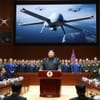North Korean leader Kim Jong Un has emphasized the importance of artificial intelligence (AI) development for his country's military modernization, particularly in enhancing drone technology. During a visit to the Unmanned Aeronautical Technology Complex in Pyongyang, Kim inspected performance tests of multipurpose drones and unmanned surveillance vehicles. He stressed the need to rapidly develop AI technology to boost unmanned weapons systems and urged officials to expand drone production capacity.
Kim's focus on AI-powered drones suggests North Korea is aiming to develop cheaper, versatile, and harder-to-detect weapons systems. This could potentially enhance the country's ability to carry out surveillance, electronic warfare, and precision strikes. The development comes as North Korea seeks to keep pace with global advancements in unmanned warfare, diversify its military arsenal, and modernize its weapons program.
The push for AI-driven drones is part of North Korea's broader efforts to elevate its international profile. Recent meetings between Kim Jong Un and Chinese President Xi Jinping and Russian President Vladimir Putin have highlighted the country's desire to strengthen its global presence.
North Korea's military capabilities are extensive, including nuclear-armed ballistic and cruise missiles, an increasing stockpile of nuclear weapons, and a nascent spy satellite program. The country has an estimated one million active-duty personnel and over seven million reservists.
Despite facing international sanctions, North Korea has managed to engage in cross-border collaborative AI research with academics in the US, China, and South Korea. The country relies heavily on China, one of the world's most dominant AI players, for its AI development.
As North Korea continues to prioritize AI and drone technology, it is likely to face increased scrutiny from the international community. The development of AI-powered drones could have significant implications for regional security and stability.


